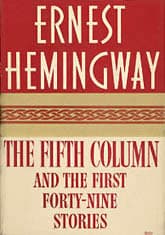The Short Happy Life of Francis Macomber
Critique • Quotes
 First book publication, 1938
First book publication, 1938First publication
1936
Literature form
Story
Genres
Literary
Writing language
English
Author's country
United States
Length
Approx. 12,500 words
Did she or didn't she?
It might be considered Ernest Hemingway's greatest story, if not for the greater popularity of "The Snows of Kilimanjaro", with which it is often paired. Both "The Short Happy Life of Francis Macomber" and "Kilimanjaro" take place on African safaris, and both were likely inspired by a 1932 hunt by Hemingway that also yielded the nonfiction book, Green Hills of Africa. Both deal more with human relations than with the hunt, and both feature Hemingway's patented cynicism.
But the tone in "The Short Happy Life of Francis Macomber" is jauntier. It's actually nearly fifty percent longer than "Kilimanjaro" but it's more narrative style makes it seem a quicker read.
The story is about a triangle of a rich American who acts cowardly when facing his first lion, his beautiful wife who mocks him, and the hunter guide she takes up with. Much of the story is told from the perspective of the professional hunter who is perplexed by the behaviour of his wealthy charges.
Their story is deceptively developed. At first it appears Macomber has been the hero of a recent lion kill, but through the sparse banter between the three principals it becomes evident he had in fact embarrassed himself. Only a dozen pages in do we get the full story, as the hunt is recounted in a flashback.
But several twists follow in present time, as Macomber and wife Margot trade barbs, she apparently cuckolds him, and he redeems himself—at least in the eyes of the man she sleeps with—on another hunt. And a final confrontation with a wounded animal ends unexpectedly.
Facing adversity
The "happy" in the story's title is not entirely ironic, as Macomber experiences a new excitement when he becomes—at last—a man of action. The professional hunter, who seems a stand-in for the author, sees this as a delayed passage into manhood.
This may seem to be part of the much-criticized Hemingway machismo, equating killing an animal with proving manliness. But that's not the equation Hemingway is putting forward here. Rather, he's expressing the moment a man stands up for himself against the social structures, represented here by the wife, that keep him weak in the face of adversity. (Yes, as in "The Snows of Kilimanjaro", it's women again who carry the weight of symbolizing the blame for male weakness.)
But neither is the "short" of the title inaccurate. The individual's happiness does not last. How it is ended—purposely or accidentally—is left inconclusive.
There's even some debate over the motivation behind the hunter's response at the end.
But it scarcely matters. As in many a Hemingway tale, the ending is both tragic and fully accepted as the way the world works. Which may be called wisdom or cynicism, depending on whether you share that outlook.
"The Short Happy Life of Frances Macomber" was adapted into film as The Macomber Affair in 1947 with Gregory Peck as a hunter again (but before his turn in The Snows of Kilimanjaro) and Robert Preston as the ill-fated Macomber. The film is generally considered one of the most faithful cinematic versions of the author's vision—however you value that.
— Eric
Critique • Quotes

